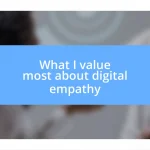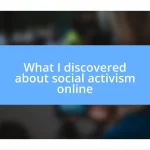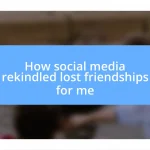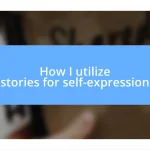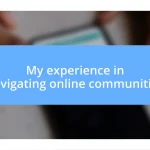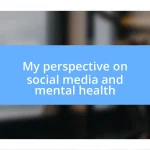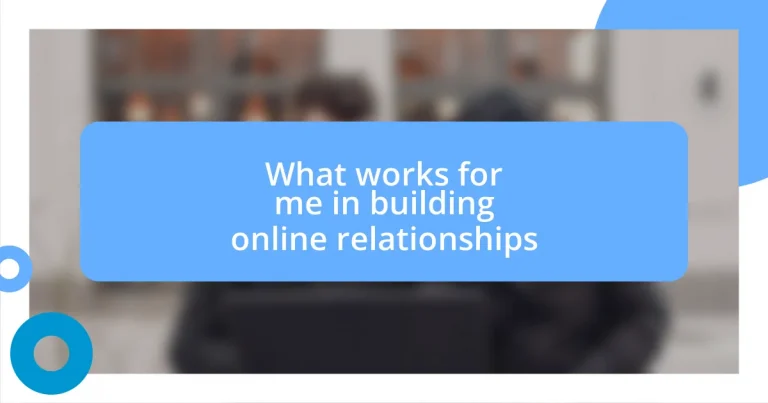Key takeaways:
- Online relationships can thrive through emotional connections, trust, and vulnerability despite the absence of face-to-face interactions.
- Understanding audience needs through engagement, active listening, and personalized communication enhances content relevance and fosters meaningful connections.
- Nurturing long-term relationships requires consistency, recognition of achievements, and genuine interaction, which strengthens trust and camaraderie over time.
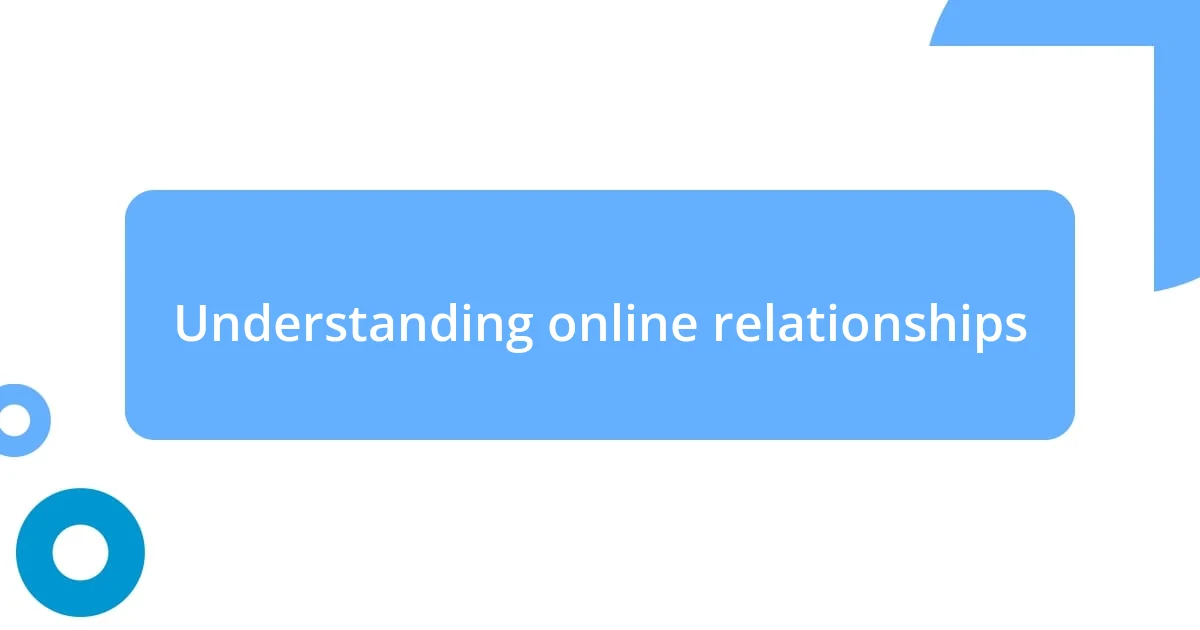
Understanding online relationships
When I think about online relationships, it’s fascinating how deeply they can affect us, even without face-to-face interaction. I remember my own experience with connecting through social media platforms, where I felt an instant bond with someone I had never met. It made me realize that emotional connections can thrive in the digital realm, fueled by shared interests and experiences, even if the physical world separates us.
Isn’t it curious how the anonymity of the internet can lower our defenses? I once joined an online forum for writers, where I felt comfortable sharing my insecurities about my work. This vulnerability led to genuine friendships; we supported each other’s journeys, proving that the essence of relationship-building—trust and empathy—transcends the physical space. It’s moments like these that truly highlight the beauty of online interactions.
However, online relationships do come with their own set of challenges. I’ve encountered misunderstandings due to misinterpretations of tone in written messages, reminding me that clear communication is crucial in this space. It’s essential to be mindful of how our words might be perceived, as the lack of non-verbal cues can sometimes lead to misjudged intentions. How do we navigate these complexities? I’ve found that patience and a willingness to clarify can go a long way in maintaining these connections.
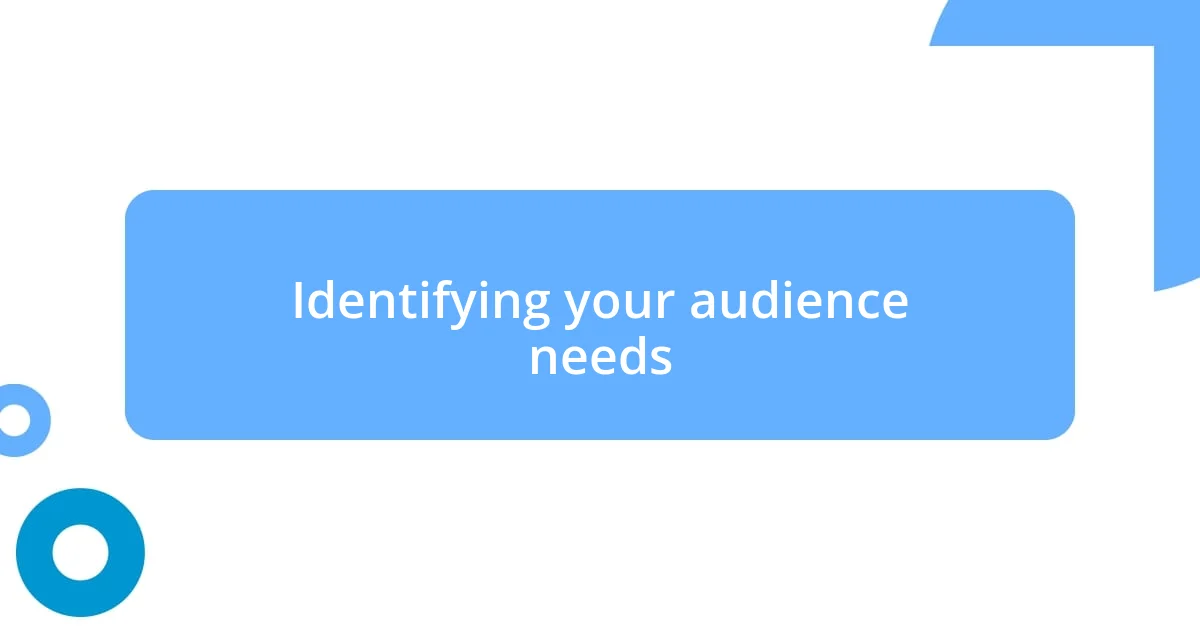
Identifying your audience needs
Understanding what your audience needs is foundational to building meaningful online relationships. I’ve had to remind myself of this often, especially when I launched a blogging platform. Initially, I wrote primarily what I wanted to share, but it didn’t resonate with my readers. After some feedback, I realized I needed to dig deeper and truly understand their preferences and pain points.
To help identify audience needs, I recommend considering the following:
- Engage Directly: Ask questions or conduct surveys to gather feedback.
- Observe Interactions: Pay attention to comments and reactions on your content.
- Segment Your Audience: Recognize that different groups may have unique needs.
- Analyze Trends: Utilize analytics tools to see what content performs best.
- Personalize Communication: Tailor your messages based on insights you’ve gained.
When I started implementing these strategies, I saw a noticeable shift in engagement. By genuinely listening to what my audience was saying, I could create content that felt more relevant and valuable to them. This journey taught me that understanding audience needs isn’t just a task—it’s an ongoing conversation.
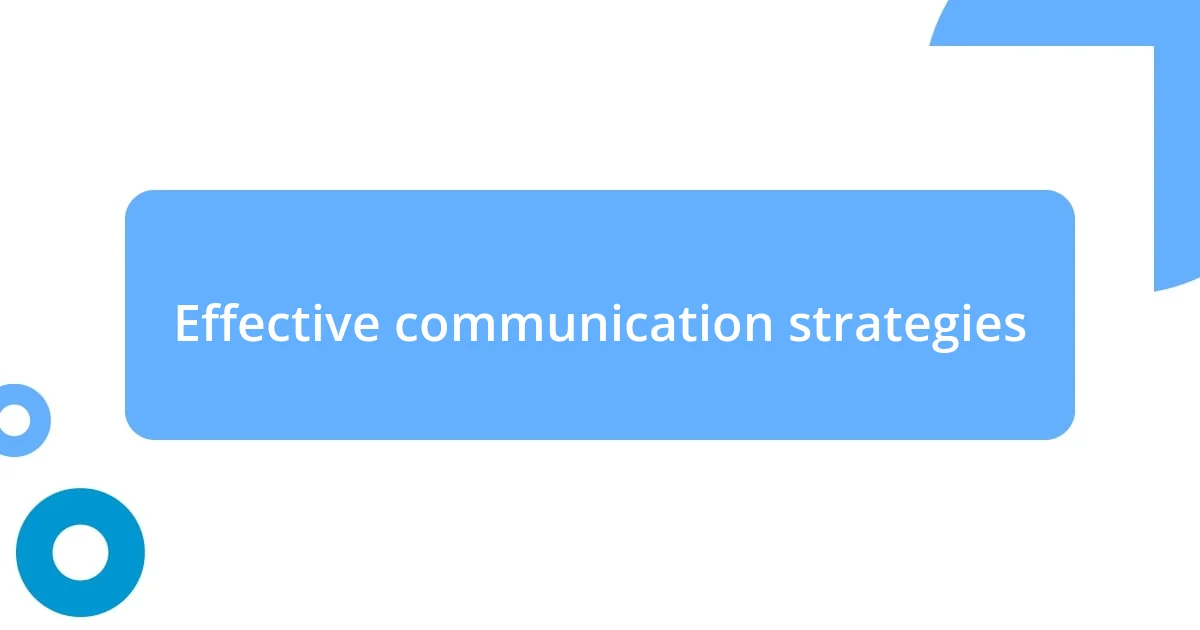
Effective communication strategies
Effective communication is the backbone of any successful online relationship. I’ve discovered that being authentic in your conversations can make a substantial difference. For instance, when I first started networking on LinkedIn, I was amazed at how sharing my true experiences and thoughts drew genuine connections. People responded positively because they felt they were interacting with a real person, not just another profile. This authenticity fosters trust and encourages deeper interactions—something I’ve always valued.
Another strategy I’ve found to be invaluable is the art of active listening. Often, during chat sessions or comments, my focus was on formulating my response instead of truly absorbing what others were saying. Once I shifted my perspective and concentrated on understanding others, my connections began to flourish. I recall a time when I participated in a virtual meetup where I fully engaged with the speaker’s insights. Later, my follow-up messages were more meaningful, and I built rapport faster than I previously thought possible.
Lastly, clarity and transparency in communication cannot be overstated. Language can be tricky in digital formats. I remember a situation where a casual comment I made inadvertently offended someone due to how it was phrased. Since then, I’ve made a point to be clear and considerate in my messages, often asking clarifying questions to make sure my tone is coming across as intended. This simple practice has helped me avoid misunderstandings and has strengthened my relationships online.
| Strategy | Description |
|---|---|
| Authenticity | Being genuine in your interactions fosters trust and encourages deeper connections. |
| Active Listening | Engaging fully in conversations improves understanding and rapport. |
| Clarity and Transparency | Clear communication helps avoid misunderstandings and strengthens relationships. |
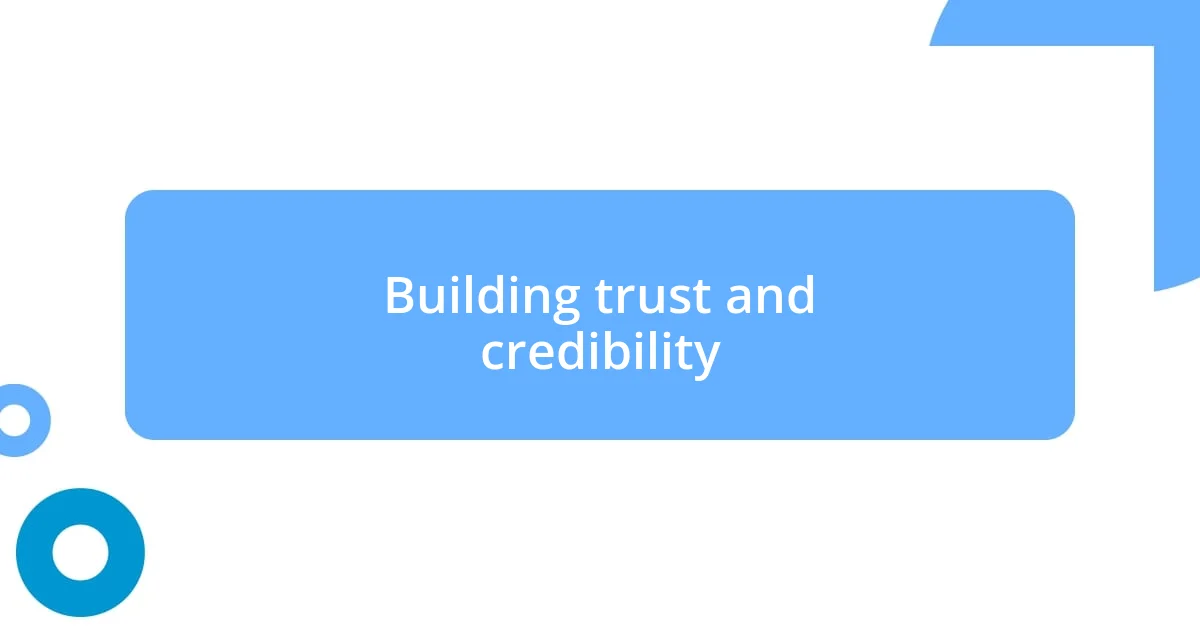
Building trust and credibility
Building trust and credibility starts with consistency. I’ve learned that showing up regularly, whether through posting content or engaging with others, signals reliability. For example, I once committed to a weekly live Q&A session, and that single choice transformed my online interactions. People began to see me as a dependable source, and trust gradually grew.
It’s also vital to share my expertise in a way that feels approachable. When I began writing tutorials on subjects I was passionate about, I noticed something interesting: vulnerability creates connection. I would share not just what worked, but also what didn’t. This blend of knowledge and honesty resonated with others, fostering a sense of community and trust. Have you ever felt more drawn to someone because they admitted their struggles? That’s the power of authenticity.
Lastly, I’ve found that asking for feedback and responding to it strengthens my credibility immensely. It can feel daunting to invite criticism, but inviting others to share their thoughts shows you value their input. There was a time when I posted a controversial perspective, and instead of shying away from the responses, I engaged openly. It didn’t just elevate my standing; it enriched the conversations, leading to deeper connections. When we include our audience in the conversation, we not only build trust but also create a shared space for growth.
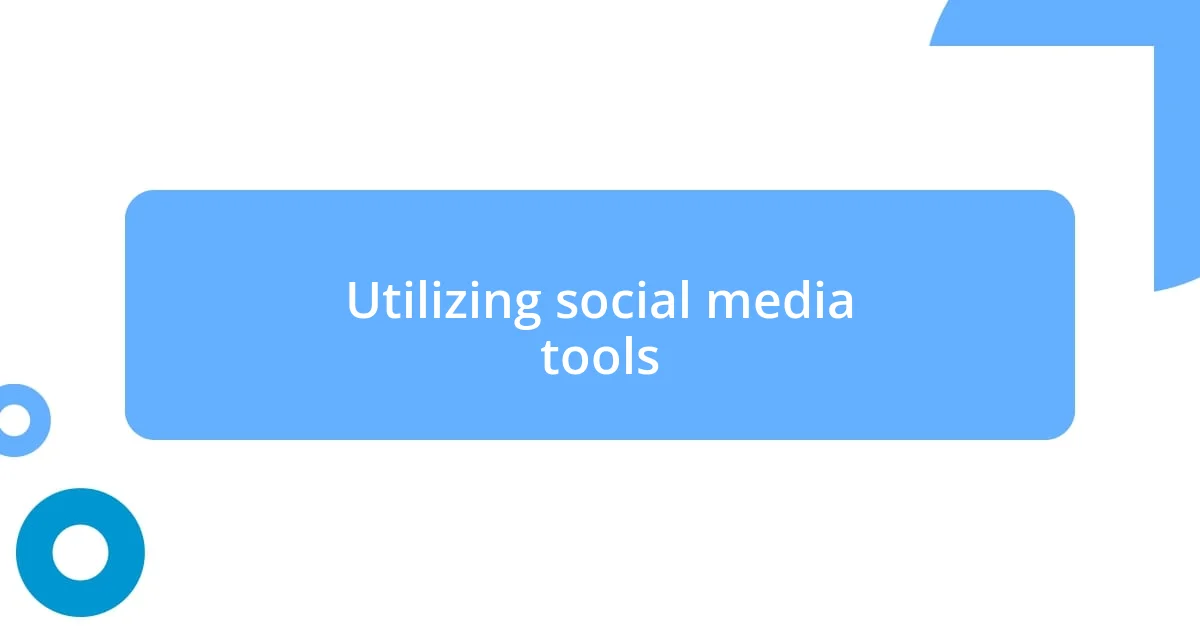
Utilizing social media tools
I’ve found social media tools to be indispensable in nurturing online relationships. The functionality of platforms like Twitter and Instagram has allowed me to showcase not just my professional side but also a bit of my personality. For instance, I started sharing snippets of my life intertwined with my work, and the response was overwhelmingly positive. It’s fascinating to think how a simple photo or story can spark a conversation where people feel inspired to share their own experiences.
When I initially embraced Facebook groups related to my interests, I was surprised by how quickly I developed a sense of belonging. I’ve participated in discussions that not only enriched my knowledge but also opened doors to friendships I wouldn’t have thought possible. Each time I contributed a thought or comment, I felt this ebb and flow of connection—like being part of a vibrant community where everyone truly cares. Isn’t it refreshing to know that behind every screen lies a potential friendship?
Utilizing LinkedIn’s features, like endorsements and recommendations, has been another game-changer for me. When colleagues endorsed my skills, I felt validated, but more importantly, it laid the foundation for deeper professional connections. I recall reaching out to someone I hadn’t engaged with in years, merely to express gratitude for their endorsement. That single message led to a rekindled collaboration, enriching our journeys together. Isn’t it incredible how a few words can strengthen a network?
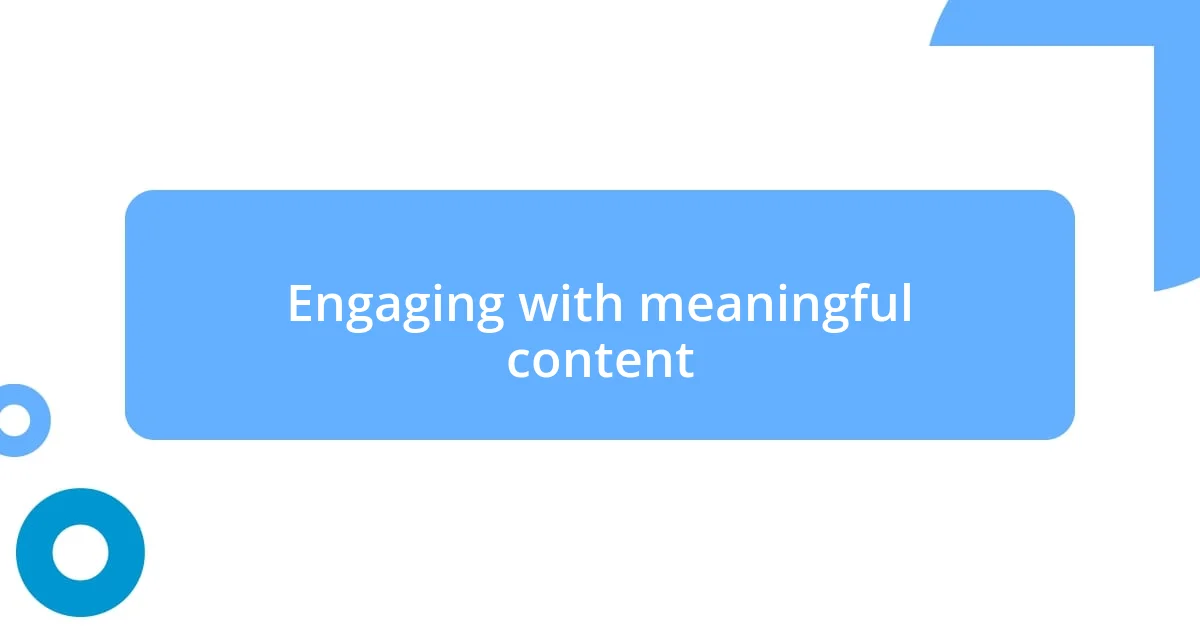
Engaging with meaningful content
Engaging with meaningful content has been a cornerstone of my approach to building online relationships. I remember the first time I shared a deeply personal story about overcoming challenges in my career. The responses were overwhelming—people didn’t just relate; they opened up about their own journeys. This exchange wasn’t just about sharing experiences; it created a ripple effect of connection, sparking conversations that felt truly impactful. Have you ever felt that warmth from shared vulnerability? It’s a powerful reminder that we’re all in this together.
Another crucial aspect is the way I curate content that resonates with my audience’s passions and interests. I often ask myself, “What can I share that will spark curiosity or provoke thought?” By doing so, I’ve not only engaged my audience but also invited them to express their views. One time, I posted a thought-provoking question related to an industry trend, and the dialogue that followed was rich and insightful—it felt less like a monologue and more like a communal brainstorming session. Don’t you find it rewarding when others chime in with their ideas and perspectives?
When I create content that inspires discussion and invites diverse opinions, I see the relationships deepen before my eyes. For instance, after publishing a blog post that challenged conventional thinking, my inbox flooded with both support and criticism. Instead of viewing the critique as negative, I embraced it as an opportunity to grow. Engaging with those who disagreed opened a dialogue that enriched my understanding and forged stronger connections. It’s fascinating how these conversations can turn into a bond built on respect and curiosity. Have you experienced similar moments where a difference of opinion brought you closer to someone?
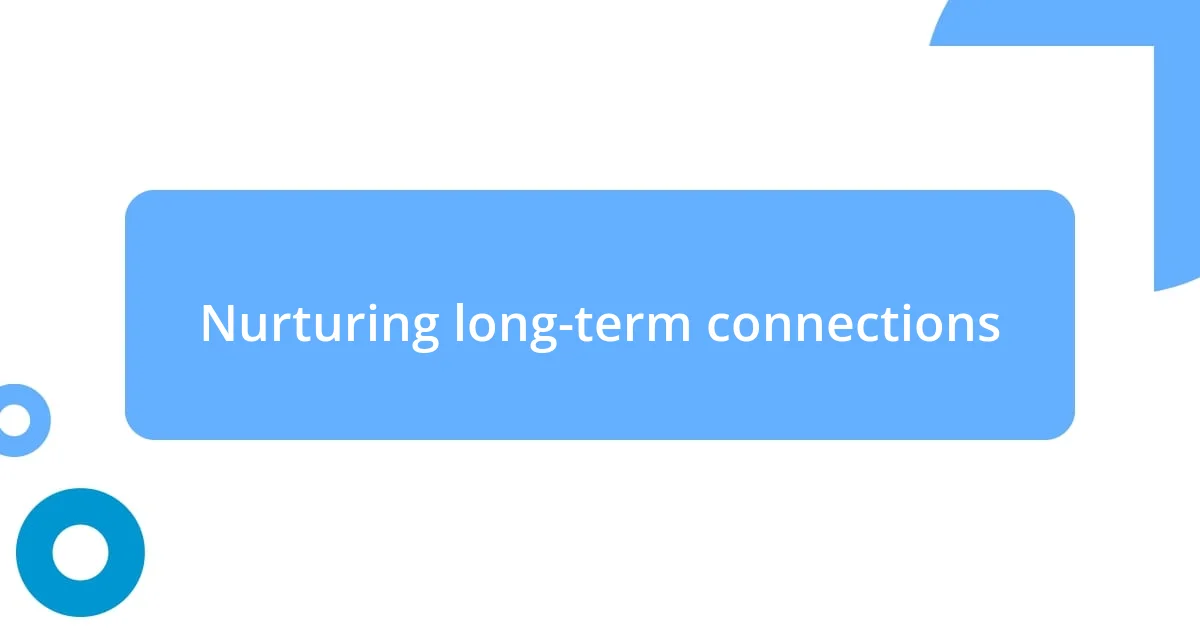
Nurturing long-term connections
Nurturing long-term connections requires consistent effort and genuine interest. One experience that stands out to me is when I started a monthly virtual coffee chat with a small group of online acquaintances. Initially, it was just a casual gathering, but over time, these chats transformed into a safe space where we could share our triumphs and struggles. It’s incredible how creating that routine not only solidified our ties but also turned acquaintances into trusted friends. Isn’t it amazing how a simple idea can blossom into something so meaningful?
I’ve learned that recognizing and celebrating milestones can greatly enhance these connections. For instance, when a colleague launched a new project, I made it a point to acknowledge their achievement publicly. A heartfelt message or even a small gesture like that can significantly impact the relationship. I can’t tell you how fulfilling it felt when the person thanked me and we exchanged stories about our respective projects. These moments of recognition reaffirm our mutual respect and commitment. Have you ever taken the time to celebrate someone else’s success?
Additionally, showing up consistently in someone’s online space solidifies the bond. I recall a period when I regularly liked and commented on a friend’s posts about their personal journey through health challenges. It was just a simple “You’ve got this!” or “So proud of you!” but that sustained interaction made a difference. Eventually, they reached out to express how meaningful my support was during a challenging time. I realized that those small acknowledgments can mean the world, forging deeper connections that last far beyond a fleeting comment. Isn’t it rewarding to know that your presence, even from afar, truly matters?


